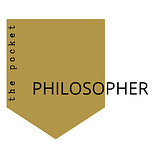**Next Monday, November 8, we have a very special announcement for all existing subscribers. Keep an eye out for a unique opportunity and update from Matt at TPP!**
Fellow Philosophers,
All this week we’re going to be studying a certain type of phenomenon. It’s a universally human reaction to the ups and downs of life. No matter how much we’d all like to be above or beyond this type of experience, it defines so much of our collective and individual lives.
In an interview about his film 2001: A Space Odyssey director (and philosopher) Stanley Kubrick said of humans,1
“We are still essentially programed with the same primitive instincts we started out with four million years ago. Somebody said man is the missing link between primitive apes and civilized human beings...We are semicivilized, capable of cooperation and affection, but needing some sort of transfiguration into a higher form of life. Man is really in a very unstable condition.”
In some ways, being human is just like that.
On one hand we can paint the Sistine Chapel, visit the moon, and love even our enemies.
On the other hand, we can be overcome with emotions like rage, jealousy, and resentment starting wars and taking human life.
Somehow, all of these things are true for each of us—sometimes in the same moment. We can be, as Kubrick says, unstable.
All this week we’re going to be studying the universal emotions of anxiety and anger, and what we might call their balancing energies: curiosity and contemplation.
I know that more than a few psychology and mental health professionals are subscribed to this newsletter. If this describes you, consider this an invitation to join the discussion and share your expertise. It will be much appreciated.
I will do my best to avoid stepping into that space, keeping my writing squarely in the world of philosophy.
This means, I will lead us in a conversation with an intent to analyze, understand, and critique a few arguments on this topic. Beyond that however, I would be very grateful for the insight and discussion of professionals. Jump in using the comment feature anytime.
The basis for our philosophical work this week comes from a talk given by teacher Pema Chodron. She is an American Tibetan Buddhist and ordained nun. The name of the talk we’ll be leaning heavily upon this week is titled Don’t Bite the Hook and is available as an audio book if you’d like to listen for yourself (highly recommend).
In this talk, Pema dissects an 8th century wisdom text by Shanti Deva which studies the experience that is human anger. It’s not an analysis of how anger is bad and peace is good. Rather, it’s a philosophical inquiry into the nature of human emotions, and how we might relate to them in a healthy way.
I’ll leave you with an opening thought from Pema, as we conclude today and prepare for part II tomorrow,2
Shanti Deva says a lot about our mindset. The mindset of friend and foe. Like and dislike. For me and against me. And how that very mechanism of buying so tightly into this notion of the good people and the bad people -- the ones that I like and the ones I don’t like and how we get so invested in this and how this is “the kindling” or “the fuel” for anger and aggression to escalate. So from this point of view, the teachings are on non-violence and on non-aggression. And you could think of that as a synonym for the word patience.
Until tomorrow, friends,
Matt
http://www.archiviokubrick.it/english/words/interviews/1968love.html
https://www.betterlisten.com/blogs/news/8330305-excerpt-from-pema-chodrons-dont-bite-the-hook















Share this post